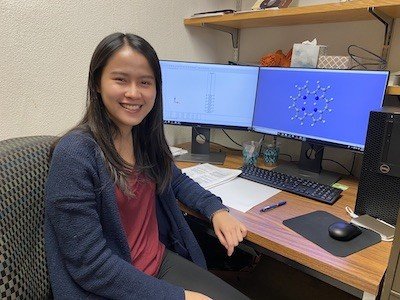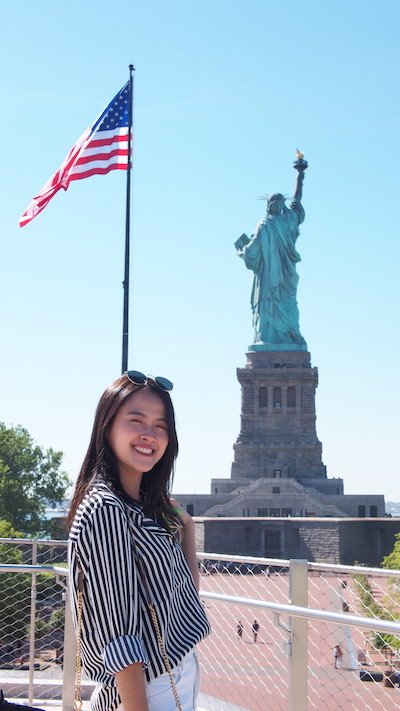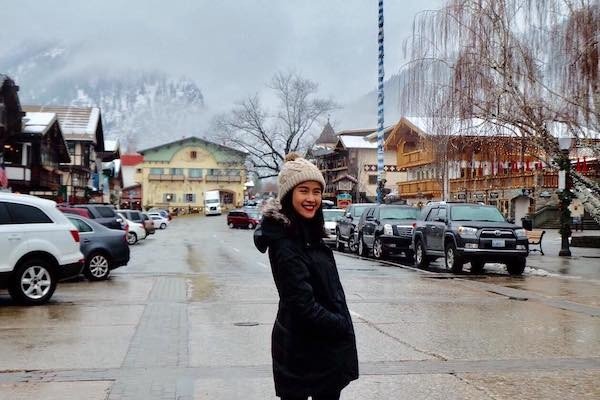Meet CTC: Siriluk Kanchanakungwankul

December 13, 2019 -- Siriluk Kanchanakungwankul is a third-year graduate student in the Truhlar group. She completed her undergraduate and master degrees in chemistry at Mahidol University in Bangkok, Thailand. Her current research uses theoretical and computational chemistry to study the rate of reaction and tunneling of double proton transfer tautomerization of porphycene in both gas phase and on a silver surface. She is also in the initial stages of two theoretical projects involving MOFs: xylene separations and production of Cu(0) catalysts.
In her free time, Siriluk enjoys watching TV shows, specifically British baking shows and the Walking Dead series. She also likes spending time with her friends, both in the Department of Chemistry and outside of it. She especially enjoys talking with other international students about cultural variations in the United States.
What is your favorite part about living in the Twin Cities?
My favorite part of living in the Twin Cities is that it is very easy to get everywhere. There is a great transportation system with buses and the light rail. I also like that the city isn’t too hectic. There are lots of convenient places to buy food and do activities with friends.
Why did you choose the University of Minnesota, and what led you to join the Truhlar group?
The main reason is that I wanted to work with Donald Truhlar. He is renowned for his success in theoretical and computational chemistry. I had a chance to work with Donald Truhlar as a visiting scholar before I applied for the University of Minnesota Department of Chemistry graduate program. He was a good mentor with good suggestions for my research. The other members of the Truhlar group were also very helpful and nice to me. The Department of Chemistry is also well-known internationally for its successful research programs. The Department and the Truhlar group were overall a great fit.

How did you become interested in studying chemistry, and what gets you the most excited about your field?
When I was in high school, I had the opportunity to do some experimentation with finding an unknown chemical formula for my unknown chemical substances. I enjoyed trying so many different experiments and using my chemistry knowledge to identify which elements were in my unknown system. I’ve been passionate about chemistry ever since.
While getting my bachelor’s degree, I did experiments in various fields of chemistry, including organic, analytical, inorganic and physical chemistry. For my research project during my senior year, I focused on theoretical and computational chemistry. I learned to love theoretical chemistry for many reasons. One is that theoretical chemists develop new methods that better explain chemical phenomena. They can design new ways of doing reaction mechanisms, which helps experimentalists reduce time synthesizing and studying reaction mechanisms. Another is that theoretical chemistry has a huge impact on many fields of study, including photochemistry, organometallic, materials, and biological systems. Theoretical chemistry has recently gained more attention from many people, including me.
What kinds of technology and techniques do you use in your research?
My current research mainly uses the High Performance Computing resources of the Minnesota Supercomputing Institute. Specifically, I use the VASP and CP2K programs for electronic structure calculation, which is for the atomic scale materials molecular modeling. I use Gaussian software for geometry optimization and frequency calculation of porphycene. To calculate the rate of reaction and tunneling, I use the Gaussrate and Polyrate methods, which were developed in the Truhlar group.
What do you enjoy most about your research? What has been your most interesting or surprising finding so far?
The part that I enjoy the most is when I need to learn a new theory, program or software that can help me study properties that I have not studied yet. I am also new to the study of materials, such as metals, so I get excited learning more about it. I am interested in using materials to separate gas and other organic molecules, and hope to explore this more in future research.
My most interesting finding is that there is tunneling of the double proton transfer between the trans to trans isomer of porphycene, but there is not any tunneling for the proton transfer from the trans to cis isomer of porphycene. The reason for this difference is being studied, but there are no clear findings yet.

Why is your research important? What are some of its real-world applications?
The porphycene and porphyrin used in my research are important in dye-sensitized solar cells (DSSCs) and other optoelectronic devices. In general, solar cells absorb visible light, such as sunlight, and convert its energy to electrical energy. In DSSCs, molecular dyes absorb sunlight so that its energy can be converted. This process is considered safer for the environment than burning fossil fuels because sunlight is a renewable energy source.
The proton transfer reaction does not only occur in the porphycene system. It is also involved in many other organic molecules and biological systems. Studying the rate of reaction of hydrogen transfer offers information about the transfer of other atoms, too. This knowledge can help scientists understand how prescription drugs work. My research with gas separation is applicable in environmental studies. We often want to separate good gases from bad ones, and my research contributes to the ability to do this.
What drives you to be a better scientist?
I am always studying and searching for new things. I have seen many things change in my life, so I think it’s important for me to always stay up-to-date with what’s going on in my field, especially because they may have an influence on what I’m working on. I’m also patient with what I’m doing, and understand that some of the research needs more time than others to explain scientifically.
What are you most proud of about your academic career so far, and what’s one thing you’d like to achieve in the future?
I am proud of myself for getting a Royal Thai Government Scholarship to support my study in the United States. I am also proud that I got accepted to this Ph.D. program, and that I passed my Ph.D. candidate exam in my second year. One thing that I would like to achieve in my career is to publish the research I have been doing.
What advice do you have for aspiring scientists?
My advice is to first love being a scientist, and then explore the broader fields of what you want to study. You should always be passionate and try to find exciting experiments to explore. It’s also helpful to think about what you can do as a scientist to contribute to the world.
